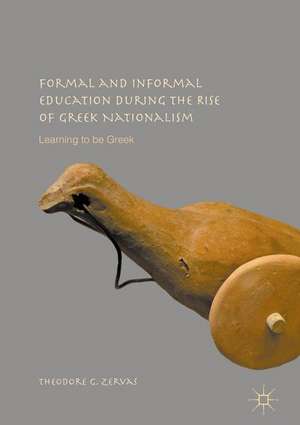Formal and Informal Education during the Rise of Greek Nationalism: Learning to be Greek
Autor Theodore G. Zervasen Limba Engleză Hardback – 9 dec 2016
Preț: 583.61 lei
Preț vechi: 686.60 lei
-15% Nou
Puncte Express: 875
Preț estimativ în valută:
111.68€ • 115.21$ • 93.19£
111.68€ • 115.21$ • 93.19£
Carte tipărită la comandă
Livrare economică 26 martie-09 aprilie
Preluare comenzi: 021 569.72.76
Specificații
ISBN-13: 9781137484147
ISBN-10: 1137484144
Pagini: 205
Ilustrații: XI, 186 p.
Dimensiuni: 148 x 210 mm
Greutate: 0.41 kg
Ediția:1st ed. 2017
Editura: Palgrave Macmillan US
Colecția Palgrave Macmillan
Locul publicării:New York, United States
ISBN-10: 1137484144
Pagini: 205
Ilustrații: XI, 186 p.
Dimensiuni: 148 x 210 mm
Greutate: 0.41 kg
Ediția:1st ed. 2017
Editura: Palgrave Macmillan US
Colecția Palgrave Macmillan
Locul publicării:New York, United States
Cuprins
Chapter 1. Introduction.- Chapter 2. Family, Community, and Childhood in the Late Nineteenth and Early Twentieth Century Greece.- Chapter 3. The School and the Textbook.- Chapter 4. Greek Children’s Literature.- Chapter 5. Learning Informally Through Story, Song, and Children’s Shadow Theater.- Chapter 6. Lives of Informal Learning.- Chapter 7. Conclusion.
Notă biografică
Theodore G. Zervas is Associate Professor of Education at North Park University, USA.
Textul de pe ultima copertă
This book examines informal modes of learning in Greece from in the late nineteenth and early twentieth centuries, set against the backdrop of Greek nationalist interests and agendas. For much of this period, one of the Greek state’s major goals was to bind the nation around a common history and culture, linked to a collective and homogenous community. This study addresses the critical relationship between the average Greek child and their home, community, and school life during the earliest stages of their education. The stories, games, songs, and theater that children learned in Greece for much of the late nineteenth and early twentieth centuries went beyond shaping their moral character or providing entertainment, but were instrumental in forging a Greek national consciousness.
Caracteristici
Explores the historical contexts of informal learning in Greece; a topic that has received limited historiographical attention Includes original research and an array of historical sources within the study Focuses on the period between 1880-1930, the years historians note to be the height of the Greek nationalistic ambitions in the Balkans
